Braving peril to reach South Africa
Gangs, crocodiles, and deportation await Zimbabweans crossing the river border.
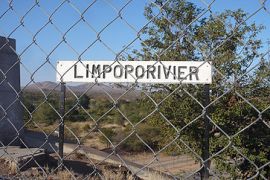
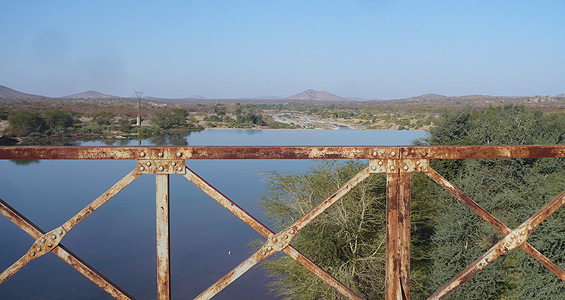 |
| The Limpopo river is a formidable obstacle to Zimbabweans planning to cross in to South Africa |
To escape a life of abject poverty in Zimbabwe, Anton Givasa, 22, made an attempt to cross the 225-kilometre Limpopo River into South Africa.
“The situation in Zimbabwe is very tough. You can’t even afford to buy food or clothes. It’s serious,” he told Al Jazeera.
“If I stay I will die; I will starve.”
Food shortages and inflation in Zimbabwe have led to a steep rise in staples – a loaf of bread now costs Zim$75bn ($7.50).
Givasa left his parents’ family home in Harare, the Zimbabwean capital, at nine in the evening and travelled for 15 hours, making one stop to buy some peanuts, in the darkness of a truck’s trailer with 11 strangers.
At the Limpopo River, a natural border where those seeking to sneak into South Africa have to negotiate not just the water but also razor sharp security fences and a criminal gang, Givasa met the maguma guma.
Criminal gangs
Members of the maguma guma gang “help” hundreds of “border jumpers” who try to illegally cross into South Africa every day.
They bypass immigration by paying off Zimbabwean security officers and assist jumpers to cross the river on the underside of a disused train bridge, at the Beit Bridge border crossing.
On the South African side of the border they cut holes in the three barbed wire fences.
Using mobile phones to alert one another, they wait in the bush until army and police vans patrolling the border have passed and give the signal for jumpers to run through to the other side.
This is all for a negotiated price – Givasa paid R120 (US$16) to the maguma guma, plus another non-negotiable R70 ($9.30) to pay off soldiers and security guards.
For those who do not have any money or do not take the maguma guma’s “assistance”, the consequences can be dire.
The maguma guma, a group of Zimbabwean men numbering in the hundreds, are known for stealing from, raping and killing those who do not use their “services”.
Beatings
Tinashe, 27, had planned to cross the border by himself.
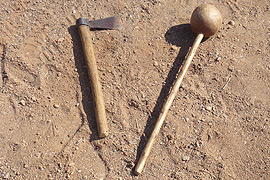 |
| The maguma guma use various weapons to intimidate and kill |
“On the Zimbabwean side I walked down some steps to the river’s edge. Six men came up to me.
“They wanted my money and took my shoes, jacket and R200 ($26.70) – all of my money.
“They then beat me on my arms with knives,” he said, lifting his jersey to reveal large red swellings on his upper arms where the weapons had hit but not penetrated.
Donald, who repairs fences along the border, said “wherever there is a point where people cross there is a maguma guma with guns and other weapons”.
“They cut people’s feet off and leave them dead in the river. I have seen people coming over naked and with injuries.”
Corpses in the water
Those jumpers who evade the maguma guma try to swim across the river border.
Even if they are strong enough to traverse the crossing which is 200m wide at some points, they still have to be wary of the crocodiles that lurk below the water’s surface.
Not surprisingly, there are many accounts of corpses in the water.
Despite the dangers, South African troops, speaking to Al Jazeera on condition of anonymity, say that there are too many people trying to cross the border for them to handle.
The situation in Zimbabwe elicits sympathy from security officials.
One soldier said that he sees between 60 and 100 border jumpers a day. He signals with his hands that he will arrest only 10 of them who will be taken back to Zimbabwe.
After reaching the South African side, jumpers may hide before making their way to roadsides for pre-arranged pick ups or run the 3km to the South African border town of Musina where they can negotiate a lift to bigger cities.
Stable existence
They hope for a more stable existence there, but that often fails to materialise.
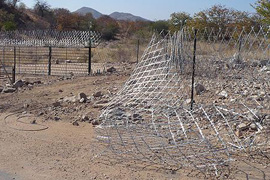 |
| A border fence has been broken through by people crossing into South Africa |
Darshan Vigneswaran, co-ordinator of the migration policy initiative at the University of Witwatersrand in Johannesburg, said “their prospects are pretty grim”.
“It depends on what skills they have and how long they can evade the law. They do domestic work and construction, for example. The conditions are terrible and they are horribly exploited, working for very little,” he told Al Jazeera.
Vigneswaran said the fact that the immigrants provide cheaper employment than locals “creates a lot of legitimate problems between them and South Africans”.
This was demonstrated in the xenophobic violence around the country in May, in which 62 people died. South African gangs burned foreigners’ homes and beat them – blaming them for adding to crime and unemployment – leaving hundreds of thousands of people displaced.
In Musina, however, Loumo, a local waiter said that although there are a few who dislike the foreigners’ presence “lots of people help them with food and clothes”.
But if they are caught by the government, they are often sent back.
The United Nations Refugee Agency (UNHCR) said last week that South Africa had sent 17,000 asylum seekers back to Zimbabwe in the previous 40 days.
“The only Zimbabweans who are getting asylum are those who come into contact with the UNHCR or our partners,” Camilla Kragelund, the head of the UNHCR’s office in Musina, said.
International law
The UNHCR says that those seeking asylum should have access to South Africa’s internationally guaranteed asylum policies, which are supposed to ensure that people will not be returned to danger or possible persecution.
Siobhan McCarthy, the chief director for communications at the Ministry of Home Affairs, said that the government was only adhering to the national immigration act.
“In terms of refugees we are obliged to review their cases and our reception centre is choc-a-block,” she told Al Jazeera.
“The challenge is that a lot of people from Zimbabwe do not fit the refugee and asylum criteria which is narrow under the UN convention.”
However, McCarthy said that the cabinet was reviewing its procedure, as “the current policy isn’t seen as efficient, in that it doesn’t address the issue that people are coming in quicker than they are being returned”.
There are presently more than 138,000 registered refugees and asylum seekers in South Africa from various nations.
Vigneswaren says that the real number is “anyone’s guess”.
He said that in 2006 South Africa deported more than 250,000 people, mostly from near the border.
“My hunch is that the total figures have increased quite dramatically over the past few years and mostly from Zimbabwe.”
Mothers and children
The UNHCR says that there is worrying trend of increased numbers of mothers and children crossing the border since Zimbabwe’s general and presidential elections in March.
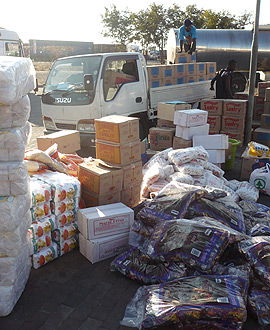 |
| Zimbabwean dealers loading trucks with goods to take back to their country |
This was said to have worsened after a subsequent crackdown on opposition supporters and the June 27 presidential run-off.
The opposition led by Morgan Tsvangirai withdrew from the run-off, saying government crackdowns on the opposition made fair elections impossible, leaving Robert Mugabe to win unopposed.
Although the UNHCR has said that these refugees are fleeing political violence and upheaval in Zimbabwe – and there is significant testimony to that in and around Musina – what Zimbabweans complain about most now that the elections are over is hunger.
The scores of pick-ups and trucks loading up basic goods, such as oil, sugar, flour and toilet paper in Beit Bridge in South Africa is a good indication of the shortage in Zimbabwe.
Dealers drive from Zimbabwe to pick up goods for sale back home, or charge those with passports for trips to buy essential goods.
Others walk across the border and back with what they can carry.
One civil servant who had walked from the Zimbabwean border said: “People have nothing to eat. There is nothing there.”
Protection permits
Malusi Gigaba, the deputy minister for home affairs, recently said increased border management was required to combat illegal immigrants.
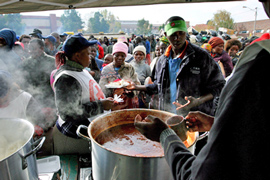 |
| Rights groups say South Africa must give temporary protection permits to Zimbabweans [EPA] |
A forthcoming document by a leading international human rights group obtained by Al Jazeera, advocates a different approach: create temporary protection permits for all Zimbabweans.
The document says that tightening security to stop people illegally crossing the border will only increase risk to immigrants, via more hazardous and corrupt methods of getting through.
The report on human smuggling across the Zimbabwean-South African border, says increased security will also raise the demand for smugglers’ services, augmenting their resources and numbers.
It says initiatives should be made by the South African government to re-route people away from smugglers to legitimate border channels.
Without such assistance, many will continue to cross the border illegally and end up living a clandestine and perilous existence in South Africa.
Givasa, who successfully jumped the border and arrived at the South African border town of Musina the next afternoon, now sleeps on the streets in Musina seeking to make his way to Johannesburg.
“My life is tough,” he said.